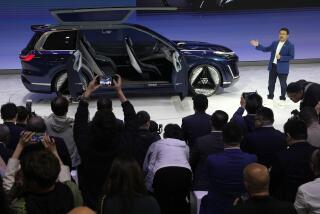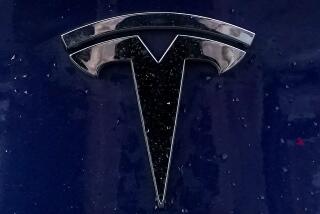Japanese Car Makers Hiking Prices Again; Sticker Shock Looms
- Share via
Japanese auto makers, stung by the latest rise in the value of the yen against the dollar, are raising prices yet again, and industry analysts now warn that their sales are starting to suffer as a result of growing sticker shock.
Japanese company executives said this week that the rapid shift in the exchange rate in the last few weeks is forcing many of them to raise prices for the seventh time since the Japanese yen began to appreciate in value against the dollar in September, 1985.
The yen’s value has increased by more than 60% during the last year and a half, making it more costly for Japanese manufacturers to produce goods for export to foreign markets.
The latest car price increases will average about 1.8% to 1.9%, or roughly $200 per vehicle, Japanese company executives now say. In the 18 months since the beginning of the 1986 model year, Japanese car prices have risen on average between 17% and 20%, while many individual models have had even larger price hikes.
“The increases now have become pretty substantial, and the Japanese are starting to feel the pinch,” said Chris Cedergren, a sales analyst with J. D. Power & Associates, a Westlake Village automotive market research firm. “Japanese prices are really getting up there.”
Nissan, for example, is about to announce a price increase of 1.9%, averaging $212 per car, that will go into effect April 10, company executives revealed this week. With that hike, Nissan’s prices will have increased nearly 22% since September, 1985, according to Chuck King, senior vice president for marketing and sales for Nissan’s Carson-based U.S. operations. Nissan plans to officially announce the latest price increase today.
Honda, which has increased its prices about 18% since late 1985, also plans to raise prices soon if the yen stabilizes in its current trading range of about 145 yen to the dollar, according to Tetsuo Chino, president of Honda’s U.S. operations in Gardena. Honda raised its prices 1.7%, or $185 per car, on Feb. 27, but Chino said the latest shift in the exchange rate will probably force Honda to impose another increase of about the same size.
“If the yen goes back up to 158 or 160 to the dollar, then our current prices are probably all right,” said Chino. “But if the yen stays at 145, our prices will have to go up some more.”
Toyota, meanwhile, raised its prices by 1.8%, or $208 per car, on March 20, bringing its total average increase in the last 18 months to about 20.5%.
Slower Pace
By contrast, Cedergren noted, during the same period domestic car prices have risen only about 8%, or less than half as fast as Japanese prices have increased.
With prices rising so rapidly, Japanese car sales are finally beginning to slow down. Although their sales didn’t seem to be affected by the first few rounds of price increases, analysts note that many import-oriented, middle-class buyers have now been squeezed out of the market by the high price tags on many Japanese models.
For example, Nissan’s Maxima sedan has risen more than $1,500 in 18 months and now costs $16,099--not counting the price hike to be announced today.
As a result, sales of Japanese-built cars, excluding sales of cars built in the United States by Japanese companies, have plunged 17% since the beginning of 1987, noted Cedergren.
At the same time, inventories of unsold Japanese cars, which have traditionally remained very low because of chronic shortages of many Japanese models at American dealerships, are now starting to balloon.
As of March 1, the Japanese industry was saddled with a 61-day supply of unsold Japanese-built cars in the United States, compared with a 30-day supply in March, 1986.
But many individual Japanese firms are in much worse shape now. While Honda, now the largest Japanese car company in the United States, still has just 15 days worth of unsold cars on dealer lots, Isuzu has a 176-day supply, Mazda 88, Subaru 101 and Nissan 61.
Part of the problem facing the Japanese this year has been the fact that car sales have been skewed by the effects of the new tax bill, which gave consumers an incentive to buy cars before Jan. 1.






